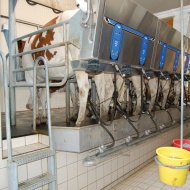Calls for greater fairness for dairy farmers

"We know how much is being paid for milk on farms. We know how much it is being sold for on the shelves. But we don't know exactly who takes what margin from that amount of money."
Dairy industry leaders have expressed their concern about the impact of falling milk prices on the industry during an evidence session with MPs at Westminster on Tuesday (November 25).
National Farmer's Union leader Rob Harrison, Farmers for Action chairman David Handley, and chairman of the Tenant Farmers Association, George Dunn, all called for more support from the government to support dairy farmers through difficult times.
David Handley told the Environment, Food and Rural Affairs committee that there had been an eight pence per litre drop (30 per cent) in milk prices over the past few months, and farmers are concerned that there could be further price drops at the beginning of next year.
"It has been particularly horrendous for the tenanted sector," said George Dunn. "Some rents were set when milk prices were much better than they are this year, and some of those rents have been difficult to be pay up."
Four hundred dairy farmers have left the industry this year and the situation is expected to get "much tougher."
David Handley added: "Its now a very serious situation, so serious that in the last nine weeks we have passed three industry dairy producers details on to the Samaritans because they were in such a desperate state. I don't think the full impact is being seen."
The MPs heard that there needs to be a much greater transparency in the dairy industry.
George Dunn said: "We know how much is being paid for milk on farms. We know how much it is being sold for on the shelves. But we don't know exactly who takes what margin from that amount of money."
He suggested that there needs to be some sort of statutory code, so that supermarkets could not offload 'loss leaders' onto the dairy industry. Therefore if supermarkets want to have a price war, it is the supermarkets that take the financial hit, and not the farmers.
The problem of falling milk prices has been felt across the globe, however some European farmers have not yet felt the effect of falling milk prices.
Mr Harrison said: "The majority of farmers are members of cooperatives in Europe, and that has meant that some of those co-ops have taken the decision to soften the blow. They are also paying some of those milk prices retrospectively, so therefore some overseas farmers have not yet felt the full effect of the falling prices.



 The Animal and Plant Health Agency (APHA) has updated its online reporting service for dead wild birds.
The Animal and Plant Health Agency (APHA) has updated its online reporting service for dead wild birds.